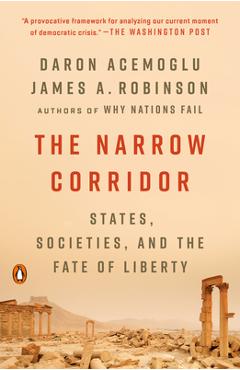Why Nations Fail: The Origins of Power, Prosperity, and Poverty - Daron Acemoglu

Detalii Why Nations Fail: The Origins
libris.ro
201.96 Lei
224.4 Lei
Political Science
Daron Acemoglu
Why Nations Fail: The Origins - Disponibil la libris.ro
Pe YEO găsești Why Nations Fail: The Origins de la Daron Acemoglu, în categoria Political Science.
Indiferent de nevoile tale, Why Nations Fail: The Origins of Power, Prosperity, and Poverty - Daron Acemoglu din categoria Political Science îți poate aduce un echilibru perfect între calitate și preț, cu avantaje practice și moderne.
Preț: 201.96 Lei
Caracteristicile produsului Why Nations Fail: The Origins
- Brand: Daron Acemoglu
- Categoria: Political Science
- Magazin: libris.ro
- Ultima actualizare: 28-10-2025 01:22:05
Comandă Why Nations Fail: The Origins Online, Simplu și Rapid
Prin intermediul platformei YEO, poți comanda Why Nations Fail: The Origins de la libris.ro rapid și în siguranță. Bucură-te de o experiență de cumpărături online optimizată și descoperă cele mai bune oferte actualizate constant.
Descriere magazin:
Two of the world\'s best and most erudite economists turn to the hardest issue of all: why are some nations poor and others rich? Written with a deep knowledge of economics and political history, this is perhaps the most powerful statement made to date that institutions matter.\' A provocative, instructive, yet thoroughly enthralling book.--Joel Mokyr, Northwestern University. Brilliant and engagingly written, Why Nations Fail answers the question that has stumped the experts for centuries: Why are some nations rich and others poor, divided by wealth and poverty, health and sickness, food and famine? Is it culture, the weather, geography? Perhaps ignorance of what the right policies are? Simply, no. None of these factors is either definitive or destiny. Otherwise, how to explain why Botswana has become one of the fastest growing countries in the world, while other African nations, such as Zimbabwe, the Congo, and Sierra Leone, are mired in poverty and violence? Daron Acemoglu and James Robinson conclusively show that it is man-made political and economic institutions that underlie economic success (or lack of it). Korea, to take just one of their fascinating examples, is a remarkably homogeneous nation, yet the people of North Korea are among the poorest on earth while their brothers and sisters in South Korea are among the richest. The south forged a society that created incentives, rewarded innovation, and allowed everyone to participate in economic opportunities. The economic success thus spurred was sustained because the government became accountable and responsive to citizens and the great mass of people. Sadly, the people of the north have endured decades of famine, political repression, and very different economic institutions--with no end in sight. The differences between the Koreas is due to the politics that created these completely different institutional trajectories. Based on fifteen years of original research Acemoglu and Robinson marshall extraordinary historical evidence from the Roman Empire, the Mayan city-states, medieval Venice, the Soviet Union, Latin America, England, Europe, the United States, and Africa to build a new theory of political economy with great relevance for the big questions of today, including: - China has built an authoritarian growth machine. Will it continue to grow at such high speed and overwhelm the West? - Are America\'s best days behind it? Are we moving from

Produse asemănătoare
Produse marca Daron Acemoglu

Why Nations Fail: The Origins of Power, Prosperity, and Poverty - Daron Acemoglu
![]() libris.ro
libris.ro
Actualizat in 28/10/2025
122.76 Lei

Power and Progress: Our Thousand-Year Struggle Over Technology and Prosperity - Daron Acemoglu
![]() libris.ro
libris.ro
Actualizat in 28/10/2025
122.71 Lei

Why Nations Fail: The Origins of Power, Prosperity, and Poverty - Daron Acemoglu
![]() libris.ro
libris.ro
Actualizat in 28/10/2025
201.96 Lei

The Narrow Corridor: States, Societies, and the Fate of Liberty - Daron Acemoglu
![]() libris.ro
libris.ro
Actualizat in 28/10/2025
117.18 Lei

